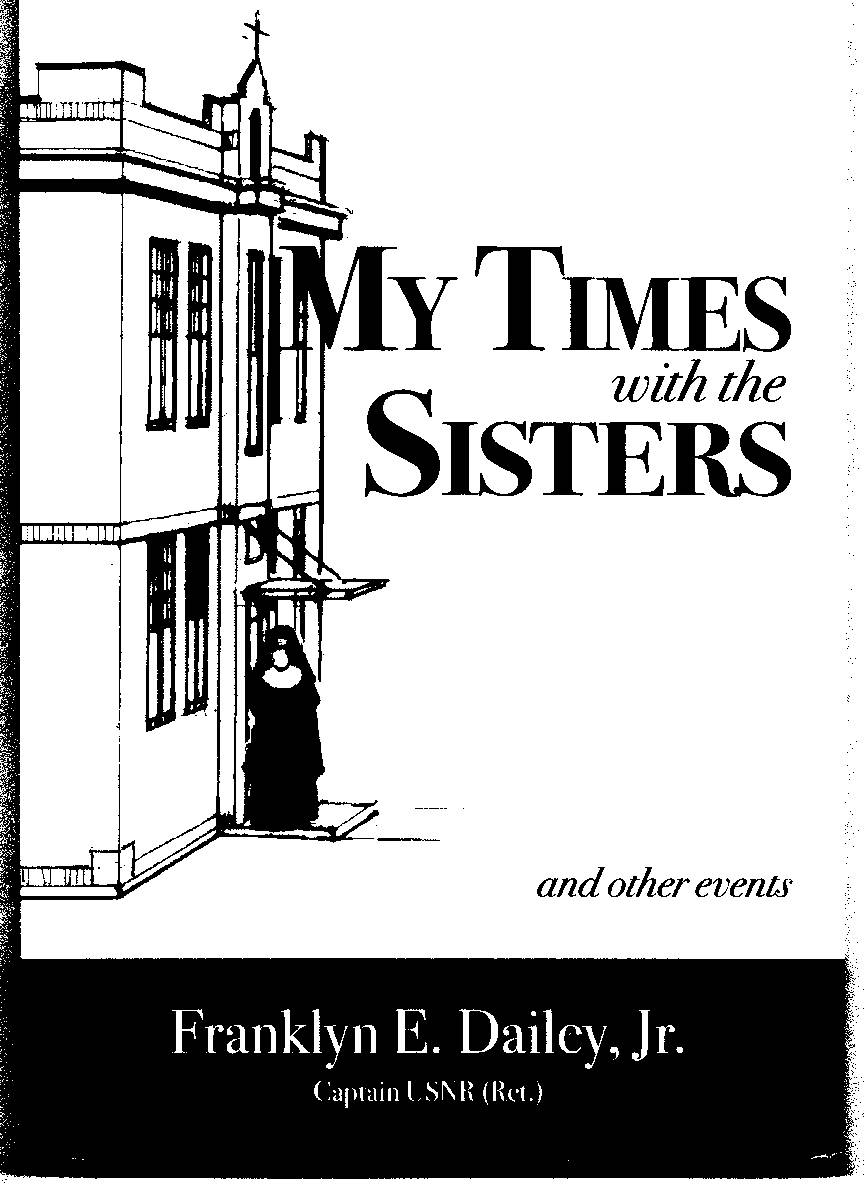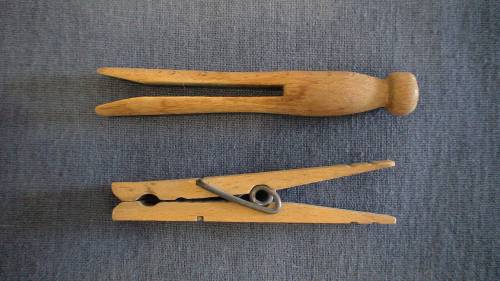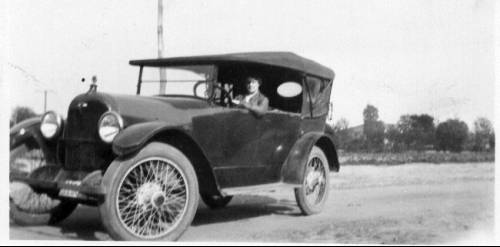
- Chapter One - An Incorporated Village
- Chapter Two - Prelude to School
- Chapter Three - A Church Is Built
- Chapter Four - I Meet Sister Lucida
- Chapter Five - The Raleighs
- Chapter Six - Sister Emma
- Chapter Seven - Patriotism and Sister Florentia
- Chapter Eight - Fifth Grade Turning Points
- Chapter Nine - Seven, Eight and You're Out
- Chapter Ten - Epilogue
Connector Page: From the left margin, links toNuns Habits & Altar Boys: 20th Century Amendments on Suffrage, Poll Taxes, Prohibition, Voting and Civil Rights, 1918 letters from mother to daughter on the Spanish Flu, and, right on this page:
Clothespins & The NFL's Greatest Game Ever Played
Copyright 2013 Franklyn E. Dailey Jr.
She looks so tiny on that bookcover, in her habit, under the front canopy of the School of the Nativity of the Blessed Virgin Mary. But when you went to school for the first time in 1926 in the First Grade, that black habit on Sister Lucida of the Sisters of St. Joseph of Carondolet loomed large to me and to my Parochial School companions.
A Guide to the stories in this 'My Times' folder follows:
First Set of ten links in the left column:
The first set of links, down the left side after the Table of Contents link, access early drafts of the 10 chapters of the published book, pictured on the upper left. For the years 1926-1932, the Sisters of St. Joseph of Carondolet represented salvation for a small boy. The boy's family life, early in the 1920s was first well-to-do, then later a family with fortunes dissipated and then devastated by the stock market crash of 1929, and the bank failures of 1933. Alcohol played a part.
The reader will find that humor throughout overcomes the grim environment of the Great Depression.When Sister Florentia and I were parted by my 8th Grade graduation in 1932, we were not to see each other for 40 years. By then, she was in the rest home of the Motherhouse. The young Sister who greeted me in the lobby, told me that all was ready for my visit, but that Sister Florentia had been 'out of it' for a few years and was not likely to know who I was. The visit did not go according to the young Sister's assessment. Sister Florentia rose to a sitting position in her bed when I asked her if she remembered the Pastor, accompanied by an exclamation that told me she was 'with it' in more ways than her loving caretakers would ever know.
Second Set of three links in the left column:
Then, proceeding down the left column, past that Chapter 10, in the next set of three links, "A 20th Century Epidemic," contains letters a mother wrote to her daughter during the flu epidemic of 1918. The mother was my maternal grandmother and the daughter was my mother's sister. These letters put the reader back into 1918 and on the scene, like the 'hear it now' and the 'see it now' of later radio and television. Following the link-back to the flu epidemic of 1918, the "21st Century Commemoration" link marks a return to the locale of the Sisters's story, and to a commemoration of the land the boy had lived on, now dedicated as a park by the village. It offers small village Western New York State perspective, the New York Central RR, the Erie Canal and SUNY Brockport New York, reflections. Then, the "Revelation of Joy" link takes the reader to a reflection that moved the author as he prepared for his 65th wedding anniversary . A passage he learned and recited as an Altar Boy in 1927 comes back to him with entirely new meaning. Even if religion is not one's interest, the change that 80 years of living make to a person's understanding of words may encourage a reader to reflect on that aspect in their own lives.

This photo is found in one of the set of stories reached through the links on the left. Kerry Bailey should be credited with this photo. It is in the "Hanging....." story link on the left . That story now has a Part II, which cheats a little by moving, very cautiously, into the 21st Century. The context is altered, to "hanging on..."
More on the third set of ten links in the left column:
This set of ten links extend the author's retrospectives on the 20th Century, beyond his own time in Parochial School. These are little essays, most with humor. Family life is noted in passing. Some of these appeared in a newspapers in suburban Springfield, Massachusetts, and some are peeks at family stays in Rochester, New York. (The author, and the family that led to eight children he shared with his wife Peggy, was launched in WW II, and moved 17 times, mostly at government expense.). The 20th Century experimented with Prohibition, then dropped it. It granted women the right to vote (August 1920, just 92 years ago as I write these lines). A byproduct for the ladies was a driver's license. My Dad had a word for it, and that word of his (a sentence actually) was highly influenced by the impending repeal of Prohibition. Find that sentence in the story in the lkbak4.htm link in the left column, 'the vote vs. the auto for ladies' and see if you agree with my Dad. Or, me.

This "touring car" as shown in one story, with a newly licensed female driver (Peg's Mom, Mary Talbott Parker) at the wheel.
Here is a sample story to illustrate the kind of tale you will find in this third set of links
December 28, 1958-"The Greatest Game Ever Played" Winners and Losers
The Frank and Peggy Dailey family were living at 185 Rutgers Street in Rochester, New York. Our children then were Frank III, Michael, Philip, Elizabeth (Missy), John, Paul and infant Tom. Vinny was yet to come. If you have read any of the short stories in this series, you will know that Christmas is a very busy time for a Catholic family especially if they have children in a nearby Catholic School. This would be Blessed Sacrament school, run by the Sisters of St. Joseph of the Rochester New York Diocese. The book I promote on these pages tells a lot more about the Sisters.
Soooo, in the year 1958, Dad was going to get a little break. The NFL Championship game was to be played on December 28, 1958 between the Baltimore Colts, a relatively new team, and the traditionally successful New York Giants, whose talented halfback was Frank Gifford. Peggy, ever generous, encouraged Dad to accept an invitation to go to a neighbor man's home. That home had a "big screen" television.
Dad had just made two new male friends, who came via parent-father relationships with the Blessed Sacrament football team, coached by Father Sundholm. One of these men had a newer better television, and he had asked Dad and the other man related to that local football team, to join in a threesome for a very heavily hyped NFL championship football game on TV.
A bit guiltily, but outwardly cool, I departed, and left family upbringing to Peg for the day. Of course the guilt is deeper because on compromises of this kind, I was by any reckoning the winner of 'time off.'
My new TV friends were regular guys in all respects. It turned out they competed with each other furiously on weekdays, but became warm friends on weekends. Competed? Well, you see they were 'outside salesmen.' One sold Dixie cups, and the other sold Solo cups. I realize I will have to bring some of you readers back to a bit of history.
We go back before plastic-enclosed "pure," water, back to the time that the Sons of the Pioneers were singing their hit song, "Cool, Cool Water." At many convenient places one would find a large inverted bottle that dispensed water, and that water could be poured into a paper cup, and happily consumed. Thirst slaked, if 'slaked' is still a good verb. Weekdays, the merits of the Dixie cup would be promoted, most often to business establishment customers by one of my new friends, and the merits of the Solo cup just as forcefully presented by the other. Even on this day of all football days, a little of that competitive spirit would leak out, if you don't mind the pun.
There was one foreboding on the horizon. Both of these men were not only aware of it, but on this aspect were in total agreement, pronouncing it a 'bad thing.' What could that be? Well, there had begun to appear at some of these convenient watering places, a machine bearing the name, General Electric. This machine squirted water into your mouth just as long as you favored it by leaning over and placing your mouth in the delivery position, while you turned a handle on the side. NO CUP! With the greatest contempt, my two new friends pronounced this machine a "BUBBLER."
As it turned out, the gifted Frank Gifford did not have his best day in the title game. A quarterback named Johnny Unitas, and a fullback named Alan Ameche, did excel, and the Baltimore Colts, a newbie winner, defeated the New York Giants in the 1958 NFL title game!
Those times now seem long ago. I hope my 'football game on TV friends' were alerted to some new opportunity, because it is clear now that the day of the paper cup at many locations was in jeopardy.
Their hated "Bubbler" became a winner.
:
The author has published three full length books set in the 20th Century:
The first covered a destroyer's actions in WW II, published in 1998. Then, in 2000, I published the memoir mentioned here about my experiences with the Sisters in a Parochial School. In 2004 came a third book about the breakthrough flight instruments that gave us the miracle of instrument flying. Finally, in 2009, with the help of a Dutch scholar, a 4th edition of that first destroyer story was published. This Fourth Edition added a 44-page Index. Spellings and usages available to a destroyer sailor in 1942-44 were updated to European and North African terminology of the 21st century.
Our title page is at www.daileyint.com for those interested in glimpses of the story on the U.S. destroyer in WW II, and the book on how instrument flight helped launch airline travel.
The web chapters of these books can be linked from the title page on our website. These include not just early drafts of the respective books but also many reader updates from vantage points closer to the 'action' than the author has had. These have been added with those readers' permissions and were thoroughly copy edited in exchanges with the originators. The term 'eyewitness' has been caretakingly used.
My objective has been storytelling from the century in which I have mostly spent my life. A byproduct of doing 20th century stories made me realize that procrastination on the part of this, the world's most successful democracy, may reveal a weakness. Putting off tough decisions began when the Founders failed to deal with slavery in the 18th Century. Then in the 19th Century, the nation had its Civil War, 500,000 died, and three Amendments to the Constitution were enacted. Giving women the right to vote in 1920 seems awfully late for a 150-year country,. Yet later in that century we still had to have an Amendment to forbid poll taxes, and enact a Voting Rights Act ,and a Civil Rights Act. Now in the 21st Century, just in the 2005-2010 period, a number of 'good intentions' with respect to 10-12 million 'illegals' in our borders have come to naught. Slavekeeping had something in common with cheap labor. Does our Constitution help us procrastinate? The nation is going to pay a huge price, as it did for not ending slavekeeping when the nation was founded, for that procrastination.
Franklyn E. Dailey Jr. Except for my blog on the military draft, that last paragraph above is the only outbreak of worry writing on the entire website. September 9, 2010